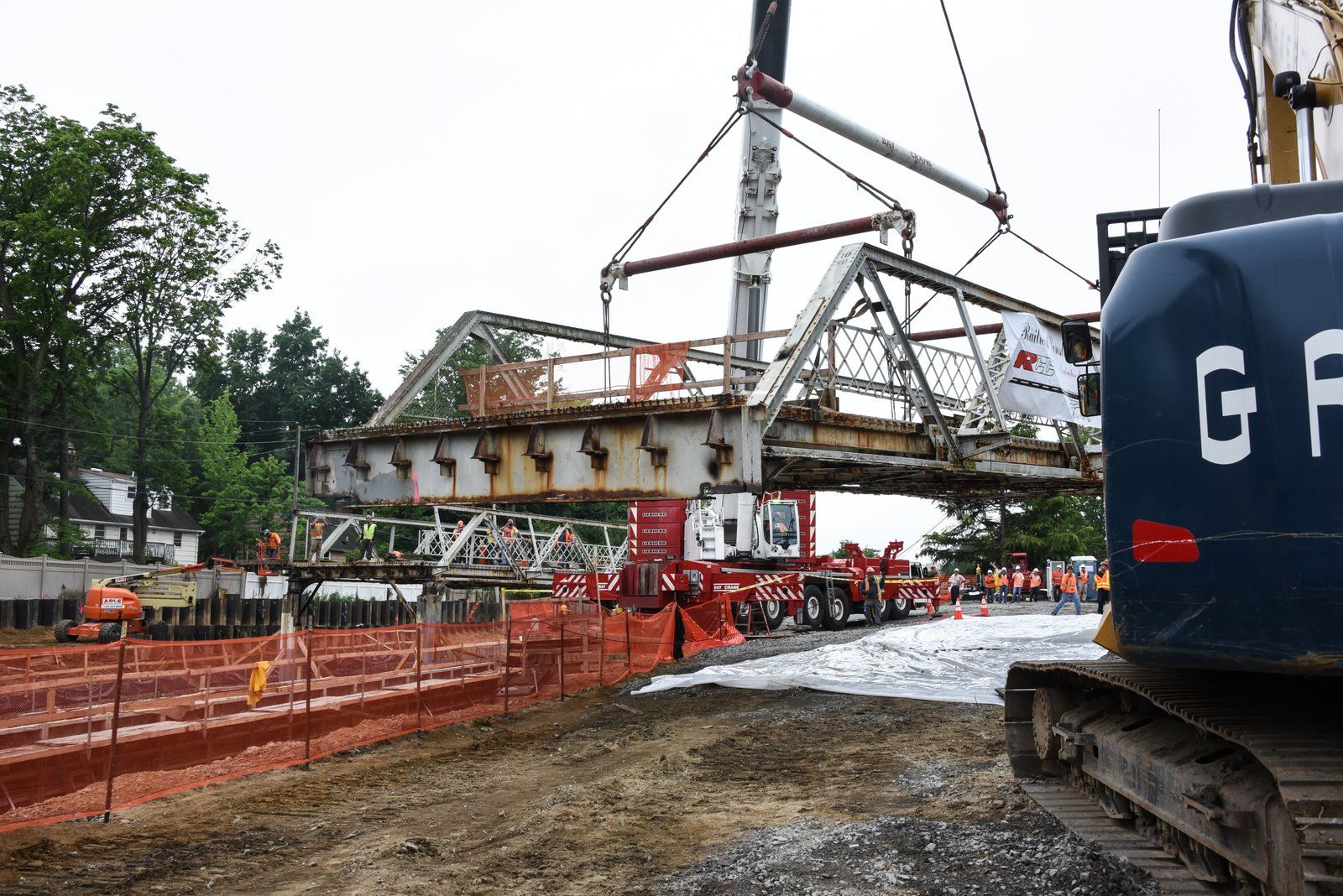The Colonial Road Bridge in the Village of Thomaston has carried motorists and travelers across the Long Island Railroad for 115 years, but its demolition was completed last weekend to make way for track and drainage improvements.
“Everything went down exactly on time in terms of the demolition,” MTA spokesman Salvatore Arena said.
The demolition, which began Saturday at midnight, resulted in an outage in train service between the Great Neck and Port Washington branches.
In place of trains, buses transported customers at the Port Washington, Plandome, Manhasset and Great Neck stations. The entire Port Washington branch also saw reduced service levels, with service being provided every hour rather than every half hour.
The demolition of the bridge, which was closed in March, is part of a $45 million project that includes making track-level drainage improvements, building a retaining wall and extending an existing pocket track used to turn trains around.
The MTA has said the replacement of the bridge is essential to the East Side Access project, which will bring the LIRR straight into Grand Central Station in Manhattan. The project, which the MTA says is still about seven years away, will cut the travel time of commuters who work on Manhattan’s east side by 20 to 30 minutes when completed.
“It’s obviously an inconvenience,” Arena said. “But I think everybody’s pretty happy that the railroad is paying for and building this bridge.”
The demolition was completed around 3:15 a.m. on Monday, and regular train service resumed as planned.
Arena said the railroad has three more train service outages scheduled for this summer to complete the project.
These outages are set to occur from 6 a.m.. to 6 p.m. on July 8, Aug. 8, and Aug 22, and the LIRR will again be providing bus service for customers on the dates of the outages. The scheduled outages are the result of preparation work being done for the installation of the new bridge, according to Arena.
He also said the bus service ran “very smoothly,” according to customers who contacted the railroad by email to compliment the service and assistance present at each station to direct customers to the buses.
In addition to affecting service between the Great Neck and Port Washington lines, the Colonial Road Bridge construction also continues to affect the daily lives of Village of Thomaston residents.
The construction has created a tremendous amount of noise and disruption to the lives of residents, Thomaston Mayor Steven Weinberg said at an MTA press conference last Thursday.
LIRR President Patrick Nowalski said the railroad is working closely with the village to ensure that the construction of the new bridge and other parts of the project result in minimal disruption to residents’ lives.
“We’re going to do everything we can to make this project as least impactful as we can,” Nowalski said.
“Before you get the finished project, unfortunately it is our residents that have to endure the construction,” Weinberg said. “But I am happy to report that the railroad has been responsive to every single one of our complaints.”
Nowalski said the railroad is aware of its responsibility to respond to issues raised by area residents.
Nowalski said the new bridge will be wider than the one knocked down, enabling LIRR trains to make more efficient turns.
He also said the construction being done to the Colonial Road Bridge will help the railroad provide better service to the community.
“It’s a project that looks forward to that project, as well as the need to replace a 100 year old structure,” Nowalski said.
Nassau County Legislator Ellen Birnbaum (D-Great Neck) also welcomed the new bridge as an improvement to the community.
She said she had spoken with many residents who feared driving over the bridge as a result of its age and the rickety sounds it made when their cars crossed over it.
“The lines of communication between the government and officials have been terrific,” Birnbaum said. “I look forward to the completion of this project, improved reliability, and safety for all.”
The project is set to be completed by the end of 2018.
Nowalski said the railroad regularly communicates with the community as it completes the installation of the new bridge.
“We intend to be good neighbors on this project and all projects that we do,” he said.
Weinberg expressed his appreciation to the MTA for working with the village.
“We look forward to continue working with the railroad in order to finish this improvement to our community, and to make this as least disruptive to our residents,” he said. “They are certainly working in the direction to achieve that.”



